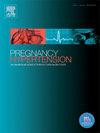妊娠相关血栓性微血管病有一系列潜在的病因
IF 2.9
4区 医学
Q2 OBSTETRICS & GYNECOLOGY
Pregnancy Hypertension-An International Journal of Womens Cardiovascular Health
Pub Date : 2025-04-29
DOI:10.1016/j.preghy.2025.101212
引用次数: 0
摘要
目的妊娠相关血栓性微血管病(pTMA)包括导致显著孕产妇发病率和死亡率以及新生儿风险的疾病。补体系统在TMA发病机制中起关键作用,妊娠触发女性易感性。由于其罕见性,pTMA的及时诊断和治疗仍然具有挑战性。本研究旨在从产科角度确定严重TMA孕妇的潜在触发因素和机制。研究设计分析了11例妊娠相关TMA并发症的临床和分子数据(2012-2022)。采用ELISA和Western blotting检测急性TMA阶段血样中抗因子H (FH)和抗adamts13抗体。下一代测序和MLPA分析评估了tma相关基因的遗传变异。结果临床记录显示相似的表现,尽管不同的诊断,包括先兆子痫,HELLP综合征,AFLP,非典型溶血性尿毒综合征和自身免疫性TTP,主要发生在妊娠晚期。8例患者产后出血(平均失血量1312 ml),活化部分凝血活酶时间正常,但纤维蛋白原水平降低。遗传结果包括1例患者C3基因2个突变,1例DGKE突变,1例因子V Leiden突变,CFHR3-1基因缺失(2例纯合,1例杂合)。在TTP病例中检测到ADAMTS13自身抗体。结论pTMA的罕见性及与其他证型的重叠标准使诊断复杂化。早期识别凝血异常、出血和心血管疾病有助于识别高危患者。表明补体失调的基因突变表明靶向治疗可以改善结果。全面诊断、及时管理和密切随访是优化母婴健康的关键。妊娠相关血栓性微血管病是一种罕见的危及生命的疾病,需要及时诊断和治疗。这项研究有助于产科医生识别高危患者。在一定比例的病例中,可以发现罕见的补体基因变异。广泛的潜在原因强调需要全面的诊断测试,以改善管理和结果。本文章由计算机程序翻译,如有差异,请以英文原文为准。

Pregnancy-related Thrombotic Microangiopathy has a spectrum of underlying causes
Objectives
Pregnancy-associated Thrombotic Microangiopathy (pTMA) encompasses disorders leading to significant maternal morbidity and mortality and risks to the newborn. The complement system plays a key role in TMA pathogenesis, with pregnancy triggering susceptibility in women. Due to its rarity, timely diagnosis and management of pTMA remain challenging. This study aimed at identifying potential triggers and mechanisms in pregnant women with severe TMA, from an obstetric perspective.
Study design
Clinical and molecular data from 11 women with pregnancy-related TMA complications (2012–2022) were analyzed. Blood samples during acute TMA stages were tested for anti-factor H (FH) and anti-ADAMTS13 antibodies using ELISA and Western blotting. Next-generation sequencing and MLPA assays evaluated genetic variants in TMA-related genes.
Results
Clinical records showed similar presentations despite diverse diagnoses, including preeclampsia, HELLP syndrome, AFLP, atypical HUS, and autoimmune TTP, primarily in the third trimester. Eight patients had postpartum hemorrhage (mean blood loss 1312 ml) with normal activated partial thromboplastin times but reduced fibrinogen levels. Genetic findings included two mutations in the C3 gene in one patient, one DGKE mutation, one factor V Leiden mutation, and CFHR3-1 gene deletions (two homozygous, one heterozygous). ADAMTS13 autoantibodies were detected in the TTP case.
Conclusion
The rarity and overlapping criteria of pTMA with other syndromes complicate diagnosis. Early recognition of coagulation abnormalities, hemorrhage, and cardiovascular disorders can help identify at-risk patients. Genetic mutations indicating complement dysregulation suggest that targeted therapies could improve outcomes. Comprehensive diagnostics, timely management, and close follow-up are crucial for optimizing the maternal and fetal health.
Key Message
Pregnancy-associated thrombotic microangiopathy is a rare life-threatening condition that requires prompt diagnosis and treatment. This study helps obstetricians to identify at-risk patients. In a proportion of cases rare complement gene variants can be identified. The broad spectrum on underlying causes highlights the need for comprehensive diagnostic testing to improve management and outcomes.
求助全文
通过发布文献求助,成功后即可免费获取论文全文。
去求助
来源期刊

Pregnancy Hypertension-An International Journal of Womens Cardiovascular Health
OBSTETRICS & GYNECOLOGYPERIPHERAL VASCULAR-PERIPHERAL VASCULAR DISEASE
CiteScore
4.90
自引率
0.00%
发文量
127
期刊介绍:
Pregnancy Hypertension: An International Journal of Women''s Cardiovascular Health aims to stimulate research in the field of hypertension in pregnancy, disseminate the useful results of such research, and advance education in the field.
We publish articles pertaining to human and animal blood pressure during gestation, hypertension during gestation including physiology of circulatory control, pathophysiology, methodology, therapy or any other material relevant to the relationship between elevated blood pressure and pregnancy. The subtitle reflects the wider aspects of studying hypertension in pregnancy thus we also publish articles on in utero programming, nutrition, long term effects of hypertension in pregnancy on cardiovascular health and other research that helps our understanding of the etiology or consequences of hypertension in pregnancy. Case reports are not published unless of exceptional/outstanding importance to the field.
 求助内容:
求助内容: 应助结果提醒方式:
应助结果提醒方式:


